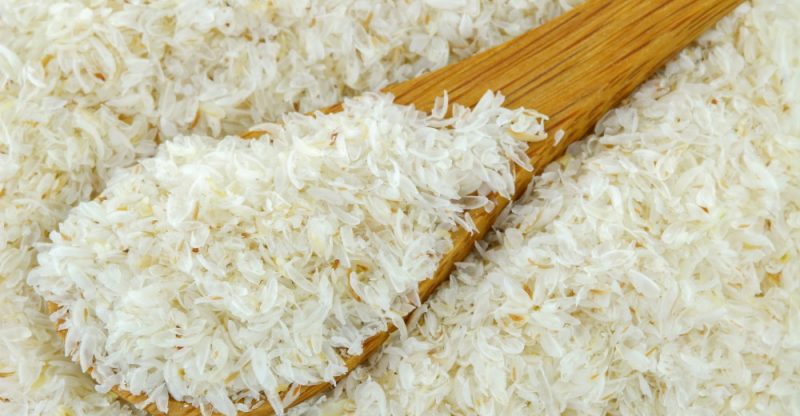Psyllium Husk Benefits
If you have ever suffered from constipation, you probably have heard your doctor recommend psyllium husk, otherwise known as soluble fiber. However, what could this herbal remedy offer to your health?
Other than improving your digestion? As it turns out, a lot! Having more fiber in your diet can have incredible benefits for your heart, digestion, blood glucose, and much more. It can even help you fight diseases!
We will discuss how this plant can improve your health.
Understanding Psyllium Husk
You may be wondering what exactly psyllium husk is. This shrub-like herb can grow in many places around the world. However, it thrives in the warm climate of India, which produces most of the commercial psyllium. Each plant can produce up to 15,000 tiny seeds that are coated in a gel-like substance.
Sometimes called isabghol, this herb has been used for thousands of years in traditional medicine to treat various conditions. Psyllium is processed to be used for people and animals. Each seed has an inner core and an outer coating.
The inner seed has beneficial fatty acids and carbohydrates, so it is often added to animal feed to improve its nutrition. The outer layer, known as the husk, is ground into dietary fiber made from this herb’s clear, gelatinous shell.
Because psyllium husk behaves like a gel when added to liquid, it is often used to thicken or change the texture of various foods while also adding fiber to them. The nutritional makeup of psyllium husk is mostly carbohydrates in the form of fiber, some fats that are primarily of the monounsaturated variety, and a small amount of protein.
The fiber in psyllium is both soluble and insoluble, which are both necessary for improving your health. While soluble fiber easily absorbs water, which causes it to expand, insoluble fiber cannot be digested and passes through your system without absorbing water.
When you eat foods containing fiber, this draws water into your digestive tract, lubricating your gut and keeping your food and wastes moving smoothly throughout your system. The soluble fiber absorbs the moisture and expands, stimulating motility and softening your stool. In addition, the insoluble portion of psyllium husk stimulates intestinal movement and enables efficient waste transport through your system.
Just one teaspoon of psyllium husk contains about 15 percent of your daily fiber requirement and is equal to eating about 200 grams or a little over one cup of steamed broccoli. Unfortunately, most people do not eat enough fiber, which places them at risk for cardiovascular disease, colon cancer, digestive problems, and other health issues.
Adding psyllium husk to your daily diet can help prevent many of these problems and allow you to get more necessary fiber into your diet.
How to Use Psyllium Husk
Psyllium husk is available in many different forms from national retailers and health food suppliers. It is widely available in the whole form or as ground powder or capsules. The complete husk form may be your best choice for those wishing to treat constipation, while other applications may consider powders or pills.
However, all types are effective, so choose the one that matches your preferences. Look for products that contain 100 percent psyllium, with no additives, sweeteners, or fillers.
For anyone over 12, the recommended daily dose of whole psyllium husk is one tablespoon mixed with at least eight ounces of liquid, up to three times per day. Most people prefer water, milk or juice.
Children between six and 12 should not exceed one teaspoon three times per day.
If you choose powdered psyllium, adults should mix one teaspoon with liquid up to three times per day, and children should take one-half of a teaspoon, up to three times per day. When you mix either whole or powdered psyllium with liquid, it will develop a thicker consistency the longer it sits.
Therefore, it is advisable to gulp it down if you do not like this texture. You can always add more water to thin the consistency.
If you choose capsules for your psyllium supplement, read the label carefully and follow the dosage instructions since all products vary in their strength. When you first start taking psyllium supplements, you should introduce them gradually into your diet, taking just one or even a half of a dose to start and adding more slowly.
If you notice excess gas or bloating, decrease your dosage until your system has a chance to adjust to the additional fiber in your diet.
Cooking with Psyllium Husk
While you can take psyllium husk by adding it to liquid and drinking it, you can also include it in various recipes, including stews, soups, and baked goods.
You will need to be sure there is enough liquid in the foods for the fiber supplement to absorb, which will also lower your risk of constipation while maintaining the dish’s texture.
You may need to add more liquid than is called for by the recipe. In recipes where you use psyllium as a binding agent, like in meatloaf, you could use less liquid. If you cook with psyllium husk, you should also be sure to drink plenty of water when eating the prepared food.
Psyllium is generally lower in carbohydrates than other bulking agents, which means you are effectively lowering the net carb count of a recipe when you use it in your preparations. In addition, by adding fiber to a dish, you are also likely to eat less of it since it fills up your stomach more quickly.
This could lead to fewer calories when used appropriately in your cooking.
Health Benefits
Getting enough fiber in your diet, in both soluble and insoluble forms, can help improve your digestive system function and benefit your health in many other ways.
In the next section, we discuss what medical researchers are learning about the advantages of psyllium husk supplementation has for your health and well-being.
Treats and Prevents Constipation
Constipation, whether occasional or chronic, can be reduced and even prevented with the addition of fiber to your diet. When you take psyllium husk, your body naturally draws in and absorbs more water to your digestive system. This can soften and expand your stool.
This stimulates natural elimination action in your colon while also making it easier to move and pass stool. In addition, taking psyllium husk has been shown to improve the time it takes for waste to travel through your system while also enhancing stool softness.
Therefore, the fiber in psyllium helps to reduce constipation symptoms without affecting the absorption of nutrients, which is often the case with other types of laxatives. As a result, taking psyllium instead of other types of laxatives, including docusate sodium, is superior for those with chronic constipation.
The soluble fiber in psyllium adds the bulk and moisture necessary for passing stools more efficiently while also resisting fermentation in the gut, unlike insoluble forms of fiber. As a result, constipation is a leading cause of hemorrhoids, which are swollen veins in your anus and rectum. These veins can bulge out from the skin or rectal opening and become irritated. In addition, when you are constipated, you are more likely to strain during a bowel movement. This worsens the hemorrhoids and causes further problems.
Taking psyllium husk helps to alleviate constipation, thereby improving the hemorrhoid symptoms over time. In addition, those who use regular treatment, including this fiber supplement, reduced pain and bleeding from hemorrhoids.
Enhances Weight Loss Efforts
One of the benefits of consuming more fiber is that this macronutrient expands in your stomach and helps you to feel fuller longer. In addition, eating higher amounts of fiber leads to feeling more sated, which reduces eating and snacking. This can help curb your appetite and lose weight.
Researchers have confirmed that a high-fiber diet, including psyllium husk, improved feelings of fullness and decreased appetite. When you eat psyllium or other forms of soluble fiber, your stomach does not empty as quickly. This reduces your desire to eat more. When you feel fuller, you are less likely to overeat, which can reduce your overall intake and your consumption of unhealthy nutrients, like fat. Eating a high-fiber diet is associated with a healthier weight, a lower body mass index (BMI), and a reduction in total body fat.
These results are achieved by adding psyllium husk to a healthy diet and other lifestyle changes that promote weight loss.
Reduces Blood Glucose and Improves Diabetes Symptoms
Another benefit of adding psyllium husks to your diet is that it can help regulate your blood sugar levels and control spikes in glucose. Fiber is an excellent way to control blood sugar. Many studies have documented that taking fiber supplements, such as psyllium reduces blood glucose levels. It also reduces HbA1c levels and insulin spikes and controls glucose absorption.
In a meta-analysis of research in this area, these results have been confirmed numerous times. Taking psyllium can also improve the effectiveness of conventional treatments for diabetes, particularly metformin. Taking this supplement with food is important for ensuring its effectiveness.
Lowers Your Serum Cholesterol Levels
In addition to lowering blood glucose levels, adding psyllium husk to your diet can also improve your overall cholesterol and lipid levels, which reduces your risk for heart disease.
Taking this supplement could reduce total serum cholesterol and improve levels of both LDL and HDL cholesterol.
One theory that is supported by research is that eating more fiber increases your body’s production of bile acid, which is responsible for removing fats from the blood.
When you have more bile, you can eliminate more cholesterol from your body without storing it, which leads to higher cholesterol levels. Reducing cholesterol levels can help reduce your risk for heart disease and other metabolic disorders while also improving your overall body composition.
Lowers Blood Pressure
Hypertension or high blood pressure is another significant risk factor for heart disease. Adding psyllium husk to your diet could help to lower high blood pressure for some people.
Eating a diet high in fiber has been shown to reduce systolic blood pressure. For those with congestive heart failure or who are otherwise have a high sensitivity to sodium, talking psyllium husk can help lessen that sensitivity and result in smaller increases in blood pressure than those who do not take psyllium.
In this way, this supplement could protect some individuals from further damage due to salt intake. However, taking psyllium should not be considered to be the only treatment necessary for managing hypertension. It should be combined with a heart-healthy diet and lifestyle changes, such as exercise. When used alone, the effects on blood pressure are only temporary.
However, when it is used in combination with other therapies, it can improve the results.
Improves Overall Heart Health
While reducing blood glucose and blood pressure, taking psyllium can have additional benefits for your heart. This includes reducing serum triglyceride levels, which are a risk factor for heart disease.
Taking psyllium can reduce triglycerides by as much as 26 percent in some cases. However, high triglycerides are a problem, especially for those with diabetes.
Therefore, reducing this heart marker is essential to keeping the heart-healthy.
Treats Other Gastrointestinal Problems
Not only can psyllium help with constipation, but it can help to treat and prevent diarrhea. This is because it doesn’t increase or decrease transit time for a stool when you take psyllium, but it simply regulates this process.
This means that you do not get hard stools from bowel movement that is too slow or very loose stools from movement that is too fast. Instead, psyllium sends out chemical messages that keep the digestive process moderate, consistent pace. This is appropriate for creating stools that are the right consistency and easy to pass.
In animal and human trials, psyllium husk has been shown to reduce diarrhea incidences and improve stool consistency effectively. This makes this herbal supplement perfect for treating disorders that result in chronic diarrhea or constipation. In addition, medications can cause diarrhea. Taking psyllium husk can help delay stomach emptying and reduce gut transit time, thus preventing or lessening the severity of diarrhea caused by these necessary medical treatments.
Patients with diseases like irritable bowel syndrome (IBS) or ulcerative colitis have also had positive results using psyllium to reduce diarrhea. For example, in one study, patients with IBS who took this supplement experienced significantly fewer episodes of loose stools. However, they returned to having these problems when they stopped taking the fiber supplement.
Similar results have been shown for patients with ulcerative colitis.
Improves Gut Health and Microbiome
Your digestive system relies on various microbes to help digest foods, extract the various nutrients your body needs and dispose of waste products effectively. These microbes comprise the microbiome of your gut.
To keep your gut healthy, you need to consume prebiotics, compounds that nourish these intestinal bacteria and yeasts, helping them flourish and do their jobs well. For example, psyllium is prebiotic since a small portion of the fiber can be fermented by your microbiome, producing short-chain fatty acids that are known to have significant health benefits.
Psyllium ferments much more slowly than other fibers, resulting in less gas and discomfort than other types of this nutrient.
This effect is believed to be why psyllium helps to treat diseases like ulcerative colitis, Crohn’s disease, and other inflammatory bowel disorders. This is especially true when psyllium supplementation is combined with probiotics, which are more of the healthy bacteria that already live in the gut.
Treats and Prevents Diseases
As we learn more about the powers of the psyllium husk to treat and prevent diseases, our understanding of this plant continues to grow. For example, recent research indicates that regular intake of psyllium husk can help to prevent colon cancer tumors from forming.
It has also been found that psyllium could help fight certain types of amoebic infections, which are known to cause a wide variety of symptoms in humans.
Precautions and Interactions
Taking psyllium husk is widely considered safe and results in very rare side effects.
The most common adverse reactions to this herbal supplement are gut discomfort that is generally mild and temporary. It would be best if you drink plenty of water when taking a fiber supplement. Psyllium absorbs water. If you overeat fiber without enough water, you can experience discomfort.
It is extremely difficult to get too much fiber in your diet, and your body will give you signs to back off or take fewer supplements when you experience bloating or excess gas. If you take powder supplements dissolved in water, drink it quickly and drink an additional glass of water after taking the supplement.
This will ensure all the fiber particles end up in your stomach and do not get stuck in your throat, which can cause choking or a scratchy throat. If you have difficulty swallowing, you shouldn’t take powdered psyllium. If you have irritable bowel disease or gut inflammation and find that psyllium makes your symptoms worse, discontinue the usage and talk with your doctor.
While many people find improvement in their symptoms, this is not always the case. If you take medications for any digestive diseases or disorders, talk with your doctor before taking psyllium husk supplements. It is always preferable to get your fiber from regularly eating foods.
However, when this is not possible, taking a psyllium supplement is considered to be a safe alternative. There is no evidence that long-term use of this herbal treatment is harmful. You should not take any fiber supplements within two hours of taking other medications.
If you have asthma, you should not breathe in the psyllium powder. This is because it can result in breathing problems. You should use a respirator when handling these materials for those who work around psyllium or prepare powders for patient use.
Long-term exposure of this powder to the airway can cause problems. It is exceedingly rare, but some people have experienced a more severe reaction to taking psyllium husk, which stopped once they ceased using the herb. In addition, psyllium was shown to interfere with lithium absorption in one patient. It can also delay the absorption of other medications, such as digoxin.
Conclusion
Fiber is an extremely important part of your diet, but not everyone can get the recommended daily amount from the foods they eat. Taking a fiber supplement, such as psyllium husks can help you get the fiber you need to improve your health. Psyllium husks are the outer coating of tiny seeds that grow on a shrub-like plant.
The husks create a gel-like substance when they absorb water. This soluble fiber is excellent for keeping your digestive system regulated. Psyllium husks can help regulate digestion, reducing both constipation and diarrhea symptoms. In addition, psyllium husks can help keep your heart healthy by lowering blood glucose, blood pressure, and triglyceride levels. This supplement can also help treat diseases of the digestive system and prevent colon cancer.
Taking psyllium regularly is also linked to enhanced weight loss.
As we learn more about the overall effects of fiber on the body overall, there is some evidence to suggest that psyllium husk supplements could be used to treat and prevent diverticulosis, hemorrhoids, kidney stones, peptic ulcers, and even PMS. So if you do not get enough fiber in your diet, consider adding a psyllium husk supplement.
It is available in many different forms to match your preferences. Your digestive and heart health will thank you.
FDA Compliance
The information on this website has not been evaluated by the Food & Drug Administration or any other medical body. We do not aim to diagnose, treat, cure or prevent any illness or disease. Information is shared for educational purposes only. You must consult your doctor before acting on any content on this website, especially if you are pregnant, nursing, taking medication, or have a medical condition.
HOW WOULD YOU RATE THIS ARTICLE?






